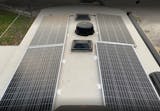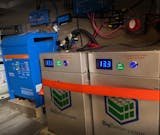What is Marine Battery?
The marine battery serves as the primary or backup power source for the boat and uses chemical energy to operate a variety of devices like illumination, a windlass, depth finders, and fish finders. A marine battery is designed specifically to withstand the vibrations and pounding of a powerboat, and has heavier plates and robust construction. Your boat moves and rocks when you sail, especially when the waves are large and persistent. Probably, a standard battery for a car won't be able to survive this movement, and that lead and other components could leak out.
The usage of lithium-ion batteries for marine applications has greatly expanded recently since they offer the largest electrochemical potential, or the ability to produce higher battery voltage than other batteries. Due to their exceptionally low resistance, lithium-ion batteries enable faster charging with fewer losses. Due to these advantages over lead acid batteries, lithium-ion batteries are increasingly being used in marine ships, which is anticipated to drive the market's expansion.
Types of Marine Batteries
Marine batteries can be classified into three types:
1. Marine Starting Batteries:
These batteries deliver short but powerful bursts of energy and are designed to start engines and be recharged quickly by the engine alternator. Using a starting battery for trolling motors or powering appliances is not recommended.
2. Marine Deep Cycle Batteries:
These batteries are designed to discharge slowly over a long period of time and to withstand several hundred charging and discharging cycles. In addition to electric trolling motors, deep cycle batteries are the perfect choice for audio systems, windlasses, depth finders, fish locators, and appliances. A deep cycle battery should not be used as a starter battery.
3. Marine Dual-Purpose Batteries:
They combine the capabilities of starting and deep cycle batteries, making them a good choice for smaller boats where there isn't room for two batteries. Although they can perform the tasks of a starting battery and deep cycle battery, they're not as efficient as separate batteries.
How to Charge a Marine Battery?
Most of us are aware that the batteries included when purchasing a new or used boat may not always be of the highest caliber. We don't give them much thought if they appear to do their function. However, in hotter regions, ordinary heat is a battery's worst enemy and can significantly reduce its lifespan. How the battery is treated at this time is particularly crucial to extending its life in regions of the country where we are required to store boats for the winter.
The best way to maintain charge when not in use is to keep batteries on a regulated "trickle" charger. If a battery is not charged (and kept charged), it may freeze in cold weather, which could lead to a broken case. Use it or lose it applies to many things in life, including batteries! Because a car is used frequently and the battery is kept charged, it typically lasts longer than a boat battery. The proverbial "two years is all a battery needs" holds true a lot of the time when it comes to boats.
In most cases, you'll get a warning when your battery is starting to die, such as a dead battery or a slower cranking speed than normal. After putting in the charger, the battery miraculously revives, and you're off on your trip. There is a possibility that a light was left on or that the radio memory pulled down the voltage. In reality, the battery may be sulfating, the plates may be warped, and it won't charge or hold a charge.
Marine Battery vs Car Battery
Whether you are new to boating or a seasoned boater, you may be wondering why you should spend the extra time and energy in a marine battery rather than a reliable vehicle battery. In spite of the fact that car batteries are not necessarily designed for such tasks, what is the real harm?
A car battery has the capacity to go through numerous discharge cycles before losing its power. It's important to comprehend the advantages marine batteries have over other car batteries for your sailing experience before succumbing to the cheap lure of a car battery.
The plates for electricity in lithium batteries for boats are stronger and raised. The purpose of this is to prevent the battery from short-circuiting while the boat is moving around in turbulent waves, which is obviously very different from driving a car on the road. In order to provide a snug fit, these batteries are additionally bonded using the precise procedures. A car battery would undoubtedly run out far more quickly if used for this. Simply put, the car battery was not intended for this kind of endeavor.
A marine battery is designed to resist the vibrations and bobbing that come with being in a vehicle on the water as opposed to a car battery, which is developed for a quick and powerful startup. No matter what season you're in, using the right battery in your boat assures not only that a variety of jobs will be carried out correctly, but also that your boating experience will be secure and long-lasting.
Frequently Asked Questions
Q. What are the advantages of marine batteries?
A. The advantages of using a marine battery are that they are more efficient, lighter and smaller in size, which means they can fit in tighter spaces on boats. They also have a longer lifespan than other batteries.
Q. How do you maintain a marine battery?
A. The first thing you need to do is keep your marine battery clean and dry. This will help prevent corrosion and will also make it last longer. You should also check the electrolyte level on your marine battery every month or two by using a hydrometer or voltmeter. If you see that there is too much acid, then you can add distilled water to bring it back.
Q. What is the main use of a 12v lithium marine battery?
A. A 12v lithium marine battery is used to power a boat, motorboat, or other watercraft. It is a type of rechargeable battery that uses lithium ions as the charge carrier.


















